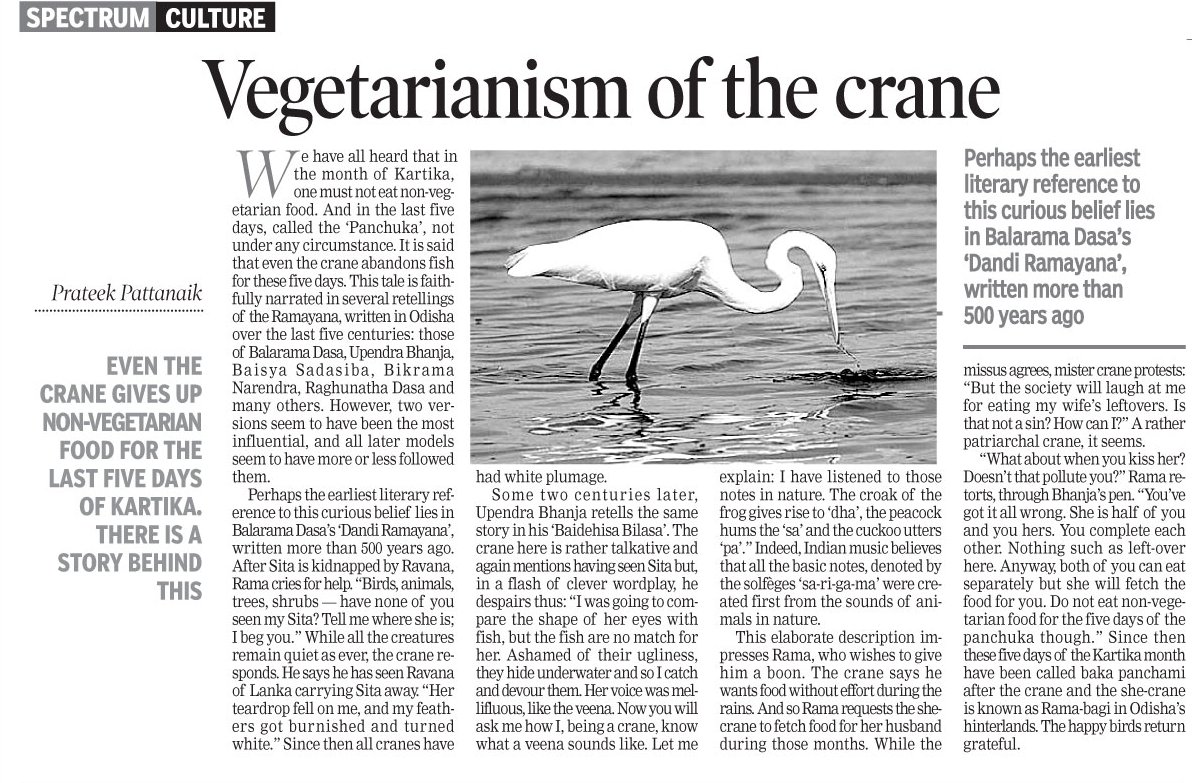Published on 8 Nov 2019 in OrissaPOST
We have all heard that in the month of Kartika, one must not eat non-vegetarian food. And in the last five days, called the ‘Panchuka’, not under any circumstances. It is said that even the crane abandons fish for these five days. This tale is faithfully narrated in several retellings of the Ramayana, written in Odisha over the last five centuries : those of Balarama Dasa, Upendra Bhanja, Baisya Sadasiba, Bikrama Narendra, Raghunatha Dasa and many others. However, two versions seem to have been the most influential, and all later models seem to have more or less followed them.
Perhaps the earliest literary reference to this curious belief lies in Balarama Dasa’s Dandi Ramayana written more than 500 years ago. After Sita’s kidnap, Rama cries for help. “Birds, animals, trees, shrubs – have none of you seen my Sita? Tell me where she is; I beg you.” While all the creatures remain quiet as ever, the crane responds. He says he has seen Ravana of Lanka carrying Sita away. “Her teardrop fell on me, burnishing my feather and turning it white.” Since then all cranes have been fair.
Some two centuries later Upendra Bhanja retells the same story in his Baidehisa Bilasa. The crane here is rather talkative and again mentions having seen Sita but in a flash of clever wordplay he despairs thus “I was going to compare the shape of her eyes to a fish, but the fish is no match for her. Ashamed of its ugliness it hides underwater and so I catch & devour it. Her voice was mellifluous like the veena. Now you will ask me how I, being a crane, know what a veena sounds like. Let me explain : I have listened to those notes in nature. The croak of the frog gives rise to dha, the peacock hums the sa and the cuckoo utters pa.” Indeed, Indian music believes that all the basic notes, denoted by the solfèges sa-ri-ga-ma were created first from the sounds of animals in nature.
This elaborate description impresses Rama, who wishes to give him a boon. The crane says he wants food without effort during the rains. And so Rama requests the she-crane to fetch food for her husband during those months. While the missus agrees, mister crane protests “But the society will laugh at me for eating my wife’s leftovers. Is that not a sin? How can I?”
A rather patriarchal crane, it seems.
“What about when you kiss her? Doesn’t that pollute you?” Rama retorts, through Bhanja’s pen. “You’ve got it all wrong. She is half of you and you hers. You complete each other. Nothing such as left-over here. Anyway, both of you can eat separately but she will fetch the food for you. Do not eat non-vegetarian food for the five days of the panchuka though.”
Since then these five days of the kartika month have been called baka panchami after the crane and the she-crane is known as rama-bagi in Odisha’s hinterlands. The happy birds return grateful.
